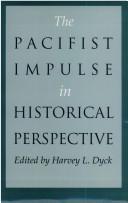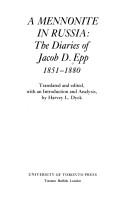| Listing 1 - 10 of 17 | << page >> |
Sort by
|

ISBN: 0802007775 9786612008153 1282008153 1442682000 9781442682009 9781282008151 9780802007773 Year: 1996 Publisher: Toronto, [Ontario] ; Buffalo, [New York] ; London, [England] : University of Toronto Press,
Abstract | Keywords | Export | Availability | Bookmark
 Loading...
Loading...Choose an application
- Reference Manager
- EndNote
- RefWorks (Direct export to RefWorks)
The opening chapter pays tribute to the pioneering leadership and scholarly accomplishments of Peter Brock and the volume includes a complete bibliography of his work in the field of peace history. The essays, presented in four parts, concentrate on the main areas of contemporary scholarship in peace history. 'Approaches to Peace History' explores conceptual issues and methods. 'Christian Traditions of Pacifism and Non-resistance' covers topics from the problem of non-violence and war in the early church, through Mennonite and Brethren traditions in the sixteenth century, to the present-day Quaker peace testimony. 'Gandhi and the Indian Tradition of Non-violence' looks at the role of violence and non-violence in Hindu and Buddhist thought and practice and in the development of Gandhi's intellectual and moral outlook. 'Pacifism and Peace Movements in the Modern World, 1890-1955' considers various aspects of the interrelationship between pacifists and internationalists and the broader movement advocating world peace. Also considered is the role of women in peace movements. This volume of twenty-three essays appears in recognition of the emergence of peace history as a relatively new and coherent field of learning. ... these essays were presented at an international conference "The Pacifist Impulse in Historical Perspective". ... Together the essays in this book explore the ideas and activities of persons and groups who, for two millennia, have rejected war and urged non-violent means of settling conflicts
Pacifism --- History --- Peace --- Sociology, Military --- Evil, Non-resistance to --- Nonviolence --- Congresses
Book
Year: 1966 Publisher: New York : Columbia University Press,
Abstract | Keywords | Export | Availability | Bookmark
 Loading...
Loading...Choose an application
- Reference Manager
- EndNote
- RefWorks (Direct export to RefWorks)
Germany --- Soviet Union --- Foreign relations
Book
Year: 1966 Publisher: New York Columbia University Press
Abstract | Keywords | Export | Availability | Bookmark
 Loading...
Loading...Choose an application
- Reference Manager
- EndNote
- RefWorks (Direct export to RefWorks)
Multi
ISBN: 9781442667723 Year: 2013 Publisher: Toronto, Ont. University of Toronto Press
Abstract | Keywords | Export | Availability | Bookmark
 Loading...
Loading...Choose an application
- Reference Manager
- EndNote
- RefWorks (Direct export to RefWorks)
Book
Abstract | Keywords | Export | Availability | Bookmark
 Loading...
Loading...Choose an application
- Reference Manager
- EndNote
- RefWorks (Direct export to RefWorks)
Book
ISBN: 1282002872 9786612002878 1442682035 9781442682030 0802004318 9780802004314 Year: 1996 Publisher: Toronto, [Ontario] ; Buffalo, [New York] ; London, [England] : University of Toronto Press,
Abstract | Keywords | Export | Availability | Bookmark
 Loading...
Loading...Choose an application
- Reference Manager
- EndNote
- RefWorks (Direct export to RefWorks)
The original documents that make up the Peter J. Braun Russian Mennonite Archive were assembled in the Molochna Mennonite settlement in southern Ukraine between 1917 and 1929. Named in honour of Peter J. Braun, a leading educator and the person most intimately involved in the establishment and development of the archive, it was created by Russian Mennonites to foster historical consciousness and research at a time when their community and land were being threatened by Russian extremist nationalists as part of a campaign against imperial Germany. Confiscated by Soviet authorities in 1929, the archive disappeared from public view for more than sixty years. It was rediscovered in 1990 in the state archives in Odessa; in 1990 and 1991, the entire archive was microfilmed and brought to Canada.The collection consists of more than 130,000 pages of documents, organized in some 3,000 chronologically arranged files. By far the most extensive collection of in-group Russian Mennonite sources surviving from the Imperial period, it spans a wide range of subjects concerning the largest and most influential Mennonite community in Russia. The archive provides fresh and concrete detail on the Russian Mennonite story, the development of the Black Sea Steppe frontier, and ethnic and religious minorities in southern Ukraine.The guide to this unique primary source material consists of a historical introduction, a detailed listing and description of the contents, a guide to the use of the microfilm (tables, keys, and a glossary), as well as illustrations and maps.
Mennonites --- Microforms --- Anabaptists --- Baptists --- Christian sects --- History --- Sources --- Bibliography --- Braun, Peter J., --- Library --- Odes'kyi oblasnyi derzhavnyi arkhiv --- Одеський обласний державний архів --- Odesʹka oblastʹ (Ukraine). --- GAOO --- DAOO --- Gosudarstvennyĭ arkhiv Odesskoĭ oblasti --- Odessa Regional State Archives --- Derz︠h︡avnyĭ arkhiv Odesʹkoï oblasti --- State Archives of Odessa Region --- SOAR --- Odessa State Archives --- Odessa Archives --- Molochansʹk (Ukraine) --- Moločansʹke (Ukraine) --- Molochanske (Ukraine) --- Molochna (Ukraine) --- Molotschna (Ukraine) --- Halbstadt (Ukraine) --- Halʹbshtadt (Ukraine) --- Arhiva de Stat a Regiunii Odessa --- Peter J. Braun Russian Mennonite Archive --- Mennoniten --- Geschichte 1803-1920 --- Quelle --- Moločna

ISBN: 1442667729 9781442667723 9781442615410 1442615419 0802027881 9780802027887 1442667737 Year: 2020 Publisher: Toronto : University of Toronto Press,
Abstract | Keywords | Export | Availability | Bookmark
 Loading...
Loading...Choose an application
- Reference Manager
- EndNote
- RefWorks (Direct export to RefWorks)
Epp's writings reveal a skilled and honest diarist of deep feelings, and tell a human story that no conventional historical account could hope to equal.
Mennonites --- Agricultural colonies --- Labor colonies --- Colonies --- Land settlement --- Anabaptists --- Baptists --- Christian sects --- Social life and customs. --- Colonization --- Epp, Jacob D. --- Khersonsʹka oblastʹ (Ukraine) --- Khersonskai︠a︡ oblastʹ (Ukraine) --- Kherson Oblastʹ (Ukraine) --- Kherson (Ukraine : Oblast) --- Kherson, Ukraine (Province) --- Khersonskaya oblastʹ (Ukraine)
Digital
ISBN: 9781442682030 Year: 2016 Publisher: Toronto, Ont. University of Toronto Press
Abstract | Keywords | Export | Availability | Bookmark
 Loading...
Loading...Choose an application
- Reference Manager
- EndNote
- RefWorks (Direct export to RefWorks)
Book
ISBN: 1442664401 9781442664401 1442646098 9781442646094 144261420X 9781442614208 144266441X 9781442664418 Year: 2018 Publisher: Toronto : University of Toronto Press,
Abstract | Keywords | Export | Availability | Bookmark
 Loading...
Loading...Choose an application
- Reference Manager
- EndNote
- RefWorks (Direct export to RefWorks)
Under Bolshevik and Nazi rule, nearly one-third of all Soviet Mennonites - including more than half of all adult men - perished, while a large number were exiled to the east and the north by the Soviet secret police (NKVD). Others fled westward on long treks, seeking refuge in Germany during the Second World War. However, at war's end, the majority of the USSR refugees living in Germany were sent to the Soviet Gulag, where many died. Paths of Thorns is the story of Jacob Abramovich Neufeld (1895-1960), a prominent Soviet Mennonite leader and writer, as well as one of these Mennonites sent to the Gulag. Consisting of three parts - a Gulag memoir, a memoir-history, and a long letter from Neufeld to his wife - this volume mirrors the life and suffering of Neufeld's generation of Soviet Mennonites. In the words of editor and translator Harvey L. Dyck, "Neufeld's writings elevate a simple story of terror and survival into a remarkable chronicle and analysis of the cataclysm that swept away his small but significant ethno-religious community."
Mennonites --- Persecution --- Communism --- World War, 1939-1945 --- Immigrants --- Anabaptists --- Baptists --- Christian sects --- Bolshevism --- Communist movements --- Leninism --- Maoism --- Marxism --- Trotskyism --- Collectivism --- Totalitarianism --- Post-communism --- Socialism --- Village communities --- Christians --- Religious persecution --- Atrocities --- Persecutions --- Neufeld, Jacob A., --- Soviet Union --- Virgil (Ont.) --- History
Book
ISBN: 1442622377 9781442622371 9781442645066 1442645067 1442622385 Year: 2015 Publisher: Toronto, [Ontario] ; Buffalo, [New York] ; London, [England] : University of Toronto Press,
Abstract | Keywords | Export | Availability | Bookmark
 Loading...
Loading...Choose an application
- Reference Manager
- EndNote
- RefWorks (Direct export to RefWorks)
In the eighteenth and nineteenth centuries, the Russian empire opened the grasslands of southern Ukraine to agricultural settlement. Among the immigrants who arrived were communities of Prussian Mennonites, recruited as "model colonists" to bring progressive agricultural methods to the east. 'Transformation on the Southern Ukrainian steppe' documents the Tsarist Mennonite experience through the papers of Johann Cornies (1789-1848), an ambitious and energetic leader of the Mennonite colony of Molochna. Cornies was well connected in the imperial government, and his papers offer a window not just into the world of the Molochna Mennonites but also into the Tsarist state's relationship with the national minorities of the frontier: Mennonites, Doukhbors, Nogai Tartars, and Jews. This selection of his letters and reports, translated into English, is an invaluable resource for scholars of all aspects of life in Tsarist Ukraine and for those interested in Mennonite history
Germans --- Mennonites --- Anabaptists --- Baptists --- Christian sects --- Ethnology --- History --- Cornies, Johann, --- Southern Ukraine. --- Ukraine, Southern --- Pivdenna Ukraïna --- Stepova Ukraïna --- Steppe Ukraine --- Ukraine
| Listing 1 - 10 of 17 | << page >> |
Sort by
|

 Search
Search Feedback
Feedback About UniCat
About UniCat  Help
Help News
News